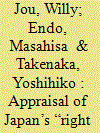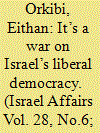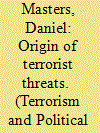| Srl | Item |
| 1 |
ID:
155209


|
|
|
|
|
| Summary/Abstract |
The conservative Liberal Democratic Party won overwhelming victories in the 2012, 2013, 2014, and 2016 elections in Japan. We discuss whether this reflected a rightward shift in the electorate, by examining how major parties and leaders are identified with particular ideological poles, and citizen–government distance on a range of issues.
|
|
|
|
|
|
|
|
|
|
|
|
|
|
|
|
| 2 |
ID:
181321


|
|
|
|
|
| Summary/Abstract |
Ruling right-wing populist parties in Europe have significantly changed foreign policies and advanced criticism against core values of liberal democracy, including dismissive stances vis-à-vis the European Union. This paper argues that the reorientation of foreign policies in Hungary and Poland is consistent with ideas developed by incumbent populist right-wing parties and intellectuals of statecraft in the wider conservative movement supporting them. The contribution studies the foreign policy conceptions of right-wing forces and builds on critical geopolitics to trace these back to ideas shaped in broader right-wing networks that have played leading roles in developing a right-wing ideological alternative to liberalism.
|
|
|
|
|
|
|
|
|
|
|
|
|
|
|
|
| 3 |
ID:
187564


|
|
|
|
|
| Summary/Abstract |
This article examines the discourse of the Israeli Left in the years preceding the succession of general elections in 2019–21, with a focus on claims of the purported threats to democracy presented by the right-wing government. Rhetorical analysis of opinion pieces and political commentary in the press on issues relating to education, science, and culture shows recurrent use of appeals to fear – such as comparisons with totalitarian regimes and invocation of other dystopian spectres resulting from nationalist indoctrination and processes of ‘religionization’. This article defines the appeal to fear and other forms of the Left’s identity claims making during this period as moral panic discourse, around which the Left sought to revive its relevance in the public debate at a time when it was viewed as a marginal political force in ideological decline. The article’s main argument is that while the labelling of the Right as a ‘danger to democracy’ has been entrenched in leftist discourse since the 1977 ‘Upheaval’, during the period in discussion it became the principal – almost sole – theme in leftist publicist discourse, serving as a flag issue around which the Left reorganised its identity as the ‘democratic camp’.
|
|
|
|
|
|
|
|
|
|
|
|
|
|
|
|
| 4 |
ID:
082925


|
|
|
|
|
| Publication |
2008.
|
| Summary/Abstract |
Recent studies indicate that the number of terrorist incidents is declining while their lethality is increasing. This trend in casualty rates has raised the rhetoric on terrorism, leading to claims that a new form of terrorism has emerged over the last thirty years. The "new terrorism" is defined by a tendency towards maximum destruction and a pronounced religious motivation. The question is whether or not the new terrorism is actually driving current trends in terrorist violence? This study examines casualty rates by terrorist groups categorized by their ideologies and finds that trends in terrorist violence are not being driven by the new terrorism per se. Instead, all forms of terrorism are more violent generally, and variations of ethno-national terrorism are the most violent specifically.
|
|
|
|
|
|
|
|
|
|
|
|
|
|
|
|
| 5 |
ID:
185751


|
|
|
|
|
| Summary/Abstract |
Poland’s ruling Law and Justice Party has drawn international attention with its hard-line right-wing rhetoric and policies on a range of issues, from immigration to LGBT rights to attempts to gain control over formerly independent institutions such as the judiciary and the media. Some critical voices in Poland and elsewhere have drawn comparisons with fascism. The party denounces such parallels, pointing out that Poland suffered Nazi occupation, even though it venerates Polish politicians of the World War II era who espoused positions such as eliminationist anti-Semitism. To avoid such impasses created by raising fascism in analyses of contemporary politics, this essay proposes using Poland as a case study for a new category of analysis: Right-wing Exclusionary Nationalist Popular Illiberalism, encompassing both classic fascism and today’s right-wing populism.
|
|
|
|
|
|
|
|
|
|
|
|
|
|
|
|